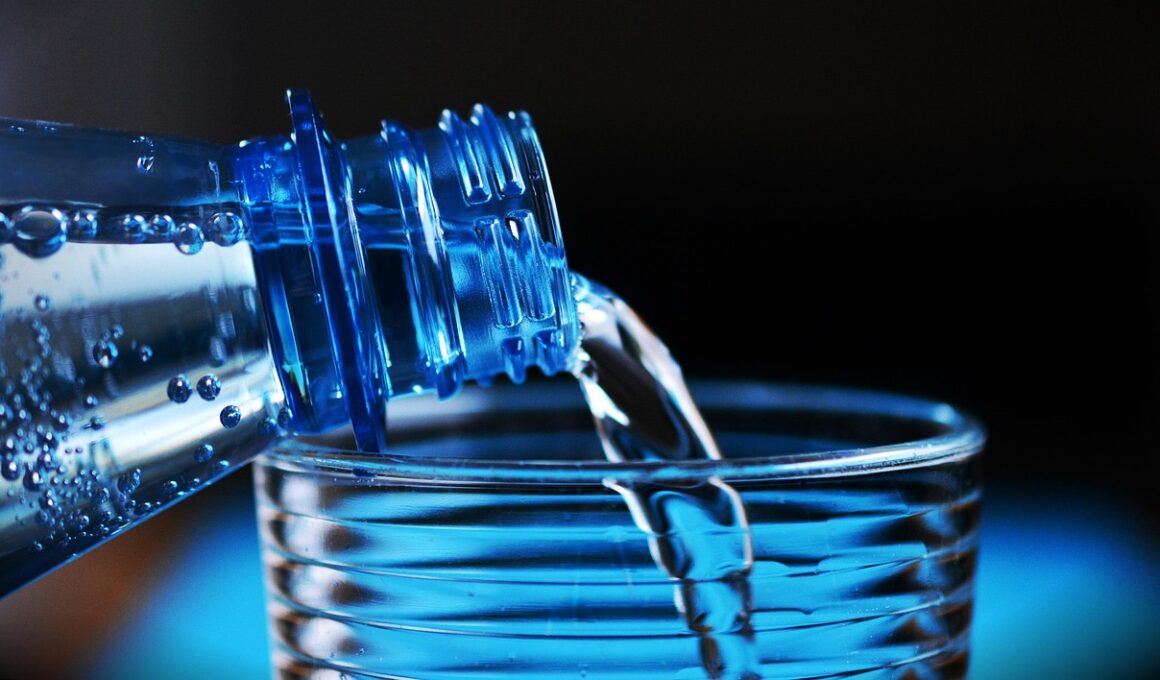Hydration Strategies to Improve Recovery in Football Players
Proper hydration is crucial for football players to achieve optimal recovery after intense training sessions or matches. Dehydration can lead to fatigue, decreased performance, and longer recovery times. Therefore, players should be proactive in managing their fluid intake. Water is the primary agent for hydration, but it’s essential to consider the electrolyte balance as well. Electrolytes, such as sodium and potassium, are vital in maintaining fluid balance in the body. Consuming sports drinks that contain electrolytes can be beneficial during and after intense exertion. Players should learn to listen to their bodies and drink whenever they feel thirsty. Ideally, they should start hydrating before intense activities, ensuring their bodies are prepared. Post-exercise hydration is equally significant, and fluids should be consumed immediately after workouts. Monitoring urine color can be an effective method for gauging hydration levels, as pale yellow often indicates adequate hydration. In addition, players should understand their individual hydration needs as factors like climate and sweat rates can significantly influence fluid requirements.
One effective strategy for football players is to establish a hydration schedule throughout training. This strategy involves drinking water regularly during practice as well as devising a pre-training and post-training hydration plan. On training days, players can consume fluids every 15-20 minutes. Additionally, pre-activity hydration may require focusing on consuming fluids two to three hours before starting. After intense training, it is also essential to incorporate recovery drinks that not only provide hydration but also include protein and carbohydrates. This combination helps to replenish glycogen stores and facilitate muscle recovery. Players should also consider hydration strategies during different seasons. For instance, in hot weather, fluid loss can be higher due to sweat, meaning hydration strategies should be adjusted accordingly. On colder days, players might not feel as thirsty, yet hydration remains vital. Incorporating water-rich foods into the diet can significantly assist in their hydration efforts. Foods such as fruits and vegetables help boost overall fluid intake and support recovery while providing essential vitamins and minerals.
The Role of Electrolytes in Recovery
Electrolytes play a critical role in hydration and recovery for football players. They help in nerve function, muscle contraction, and maintaining the body’s overall fluid balance. After extensive training or competition, players often experience significant electrolyte loss through sweat. Replenishing these lost electrolytes is essential to ensure effective muscle recovery and prevent cramping or fatigue. Sports drinks are specifically formulated to provide the right balance of electrolytes needed for after-activity recovery. Players should opt for drinks that contain sodium, potassium, and magnesium to help offset losses. Furthermore, certain natural sources can aid in electrolyte replenishment, such as bananas for potassium and salted snacks for sodium. Choosing electrolyte tablets can also be a convenient option for hydration on-the-go. However, players should be mindful of added sugars in many sports drinks; therefore, selecting those with lower sugar content is advisable. Ultimately, understanding the right balance of fluids and electrolytes will empower players to enhance their recovery processes and maintain peak performance in their sport.
Monitoring hydration levels isn’t only about quantifying fluid intake; it’s also about ensuring players consume the right types of fluids. While water is essential, the addition of carbohydrates and electrolytes can greatly assist recovery. Recovery shakes and drinks containing protein can also improve muscle repair following strenuous activities. The timing of hydration is just as crucial as the type. Players should aim to consume fluids periodically throughout the day, rather than waiting until they are thirsty. Strategies can include keeping a water bottle handy during training sessions and encouraging regular sips. Portable hydration packs can also be effective in maintaining hydration levels on the field. Before matches, players should focus on consuming adequate fluids in the hours leading up to kickoff. Again, they can utilize their urine color as an indicator of hydration levels; a light yellow hue generally indicates good hydration status. Conversely, darker urine can signal dehydration, warranting immediate fluid intake strategies. More awareness around hydration can optimize performance and recovery periods significantly for football athletes.
Individual Hydration Strategies
No two football players are exactly alike, and their hydration needs may differ. Various factors, including age, gender, body size, and sport intensity, influence how much fluid a player requires daily. It may be beneficial for players to maintain personal hydration diaries to emphasize regular fluid monitoring. Keeping a log that records how much they drink and their corresponding performance levels can provide valuable insights into their hydration habits. Additionally, understanding body weight changes before and after training can help in adjusting fluid intake requirements. Players should aim to replace any weight lost through sweat; generally, 16-24 ounces of fluid per pound lost is a good guideline. Customized hydration protocols taking into account specific positions on the field can also be helpful. For instance, positions that involve increasing stamina and endurance may need more proactive hydration strategies than those requiring less movement. Gaining awareness of personal hydration habits will support football players in formulating the best individual recovery methods for enhancing performance.
Engaging in hydration education is essential for both players and coaching staff. Training athletes about the importance of hydration can prevent misunderstandings regarding fluid intake guidelines. Teams should provide clear hydration strategies and include education sessions as part of their training program. Informational workshops, covering topics such as optimal fluid types and timing, can also encompass practices to measure hydration levels accurately. Coaches should support players in integrating these strategies into their routines, emphasizing the importance of hydration for recovery. Additionally, hydration tracking applications can offer convenient methods for players to monitor their fluid levels. The integration of technology can facilitate hydration monitoring, enabling athletes to access real-time updates. Finally, promoting a team culture that prioritizes hydration will cultivate awareness, reinforcing the significance of effective recovery strategies. When hydration becomes a shared priority within the team, players will be more proactive about maintaining their fluid levels. This shift will not only nurture recovery but also enhance overall performance, resulting in a more effective football team.
Conclusion and Future Hints
Hydration strategies directly influence recovery in football players. Players who understand the importance of proper hydration will be better equipped to recover effectively and perform at their best. Emphasizing a holistic approach, integrating hydration habits into daily routines, and educating teams about fluid intake will develop a culture of recovery. As future research continues to evolve, exploring additional recovery methods can further supplement hydration; innovative strategies like tailored hydration protocols using technology show great promise. Though simple, the act of keeping hydration at the forefront of any training program cultivates long-term benefits. Players that benefit from optimal hydration levels will demonstrate improved endurance, reduced fatigue, and quicker recovery times. Coaches urging their players to prioritize hydration can alter team dynamics for successful outcomes. Recognizing that hydration is a crucial component, alongside nutrition and rest, will support athlete development and performance overall. Ultimately, improved recovery methods through strategic hydration will foster both individual growth and enhance team success in football universally.
Overall, refining hydration methods can significantly impact performance. In managing recovery effectively from training and matches, attention must be directed towards fluid and electrolyte balance. Establishing proactive hydration plans will benefit football players, ensuring they recover effectively and efficiently. Consulting with sports nutritionists can also provide tailored insights about individualized hydration needs, making recovery a priority. Hydration is just as essential as physical conditioning and skill training; both require consistent attention to enhance performance. The integration of recovery strategies focusing on hydration can empower football players, ensuring they are prepared for upcoming challenges. Players willing to invest in their hydration strategies will reap long-term rewards in their training and match performances. Ultimately, moving forward, hydration will remain a pertinent aspect of athlete wellness and success. Through ongoing education and innovation, football teams can help athletes achieve optimal fitness levels, securing their place within the competitive world of football.


